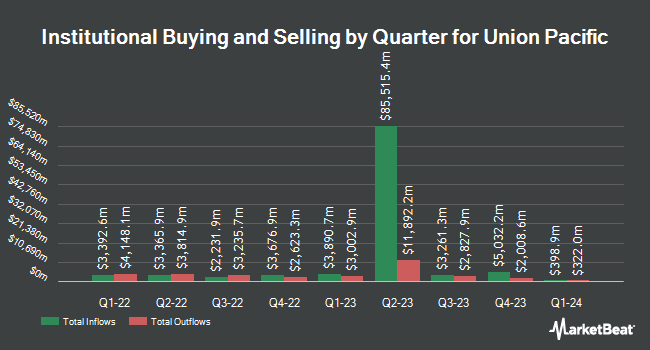Fiduciary Alliance LLC lessened its holdings in Union Pacific Corporation (NYSE:UNP - Free Report) by 51.1% in the second quarter, according to the company in its most recent Form 13F filing with the Securities and Exchange Commission (SEC). The firm owned 1,860 shares of the railroad operator's stock after selling 1,946 shares during the quarter. Fiduciary Alliance LLC's holdings in Union Pacific were worth $428,000 at the end of the most recent quarter.
Other institutional investors and hedge funds also recently modified their holdings of the company. Northern Trust Corp grew its stake in Union Pacific by 2.0% during the 1st quarter. Northern Trust Corp now owns 7,105,382 shares of the railroad operator's stock worth $1,678,575,000 after buying an additional 142,732 shares during the last quarter. Price T Rowe Associates Inc. MD increased its holdings in shares of Union Pacific by 5.4% in the 1st quarter. Price T Rowe Associates Inc. MD now owns 6,949,345 shares of the railroad operator's stock worth $1,641,715,000 after acquiring an additional 354,463 shares during the period. Royal Bank of Canada lifted its position in Union Pacific by 1.7% in the 1st quarter. Royal Bank of Canada now owns 5,105,784 shares of the railroad operator's stock valued at $1,206,191,000 after purchasing an additional 86,292 shares during the last quarter. Canada Pension Plan Investment Board lifted its position in Union Pacific by 10.8% in the 1st quarter. Canada Pension Plan Investment Board now owns 4,626,200 shares of the railroad operator's stock valued at $1,092,893,000 after purchasing an additional 452,788 shares during the last quarter. Finally, Nuveen LLC acquired a new position in Union Pacific during the 1st quarter valued at about $988,822,000. 80.38% of the stock is owned by institutional investors and hedge funds.
Union Pacific Price Performance
Union Pacific stock traded up $5.17 during midday trading on Monday, hitting $225.78. The company's stock had a trading volume of 8,135,975 shares, compared to its average volume of 4,561,980. Union Pacific Corporation has a 12 month low of $204.66 and a 12 month high of $256.84. The company has a quick ratio of 0.53, a current ratio of 0.65 and a debt-to-equity ratio of 1.86. The company has a market capitalization of $133.89 billion, a PE ratio of 19.62, a price-to-earnings-growth ratio of 2.14 and a beta of 1.03. The stock's 50-day moving average price is $222.51 and its 200-day moving average price is $224.70.
Union Pacific (NYSE:UNP - Get Free Report) last announced its quarterly earnings data on Thursday, July 24th. The railroad operator reported $3.03 earnings per share (EPS) for the quarter, topping the consensus estimate of $2.84 by $0.19. Union Pacific had a net margin of 28.43% and a return on equity of 41.73%. The company had revenue of $6.15 billion for the quarter, compared to analysts' expectations of $6.09 billion. During the same quarter in the previous year, the company posted $2.74 EPS. The business's revenue was up 2.4% compared to the same quarter last year. Analysts anticipate that Union Pacific Corporation will post 11.99 earnings per share for the current fiscal year.
Union Pacific Increases Dividend
The company also recently declared a quarterly dividend, which will be paid on Tuesday, September 30th. Stockholders of record on Friday, August 29th will be issued a dividend of $1.38 per share. This is an increase from Union Pacific's previous quarterly dividend of $1.34. This represents a $5.52 dividend on an annualized basis and a dividend yield of 2.4%. The ex-dividend date is Friday, August 29th. Union Pacific's dividend payout ratio (DPR) is presently 47.96%.
Analyst Upgrades and Downgrades
Several brokerages have commented on UNP. Susquehanna dropped their price target on shares of Union Pacific from $260.00 to $257.00 and set a "positive" rating on the stock in a research note on Wednesday, July 30th. UBS Group raised their target price on Union Pacific from $238.00 to $240.00 and gave the company a "neutral" rating in a research report on Friday, July 25th. Royal Bank Of Canada lifted their target price on Union Pacific from $257.00 to $276.00 and gave the company an "outperform" rating in a research note on Wednesday, July 30th. Raymond James Financial reiterated a "strong-buy" rating on shares of Union Pacific in a research report on Tuesday, July 15th. Finally, Baird R W raised Union Pacific to a "hold" rating in a report on Tuesday, July 1st. One equities research analyst has rated the stock with a Strong Buy rating, fifteen have issued a Buy rating and ten have issued a Hold rating to the company. According to MarketBeat.com, Union Pacific has an average rating of "Moderate Buy" and an average price target of $259.38.
View Our Latest Research Report on Union Pacific
Union Pacific Profile
(
Free Report)
Union Pacific Corporation, through its subsidiary, Union Pacific Railroad Company, operates in the railroad business in the United States. The company offers transportation services for grain and grain products, fertilizers, food and refrigerated products, and coal and renewables to grain processors, animal feeders, ethanol producers, renewable biofuel producers, and other agricultural users; and construction products, industrial chemicals, plastics, forest products, specialized products, metals and ores, petroleum, liquid petroleum gases, soda ash, and sand, as well as finished automobiles, automotive parts, and merchandise in intermodal containers.
Recommended Stories

Before you consider Union Pacific, you'll want to hear this.
MarketBeat keeps track of Wall Street's top-rated and best performing research analysts and the stocks they recommend to their clients on a daily basis. MarketBeat has identified the five stocks that top analysts are quietly whispering to their clients to buy now before the broader market catches on... and Union Pacific wasn't on the list.
While Union Pacific currently has a Moderate Buy rating among analysts, top-rated analysts believe these five stocks are better buys.
View The Five Stocks Here

We are about to experience the greatest A.I. boom in stock market history...
Thanks to a pivotal economic catalyst, specific tech stocks will skyrocket just like they did during the "dot com" boom in the 1990s.
That’s why, we’ve hand-selected 7 tiny tech disruptor stocks positioned to surge.
- The first pick is a tiny under-the-radar A.I. stock that's trading for just $3.00. This company already has 98 registered patents for cutting-edge voice and sound recognition technology... And has lined up major partnerships with some of the biggest names in the auto, tech, and music industry... plus many more.
- The second pick presents an affordable avenue to bolster EVs and AI development…. Analysts are calling this stock a “buy” right now and predict a high price target of $19.20, substantially more than its current $6 trading price.
- Our final and favorite pick is generating a brand-new kind of AI. It's believed this tech will be bigger than the current well-known leader in this industry… Analysts predict this innovative tech is gearing up to create a tidal wave of new wealth, fueling a $15.7 TRILLION market boom.
Right now, we’re staring down the barrel of a true once-in-a-lifetime moment. As an investment opportunity, this kind of breakthrough doesn't come along every day.
And the window to get in on the ground-floor — maximizing profit potential from this expected market surge — is closing quickly...
Simply enter your email below to get the names and tickers of the 7 small stocks with potential to make investors very, very happy.
Get This Free Report
Like this article? Share it with a colleague.
Link copied to clipboard.